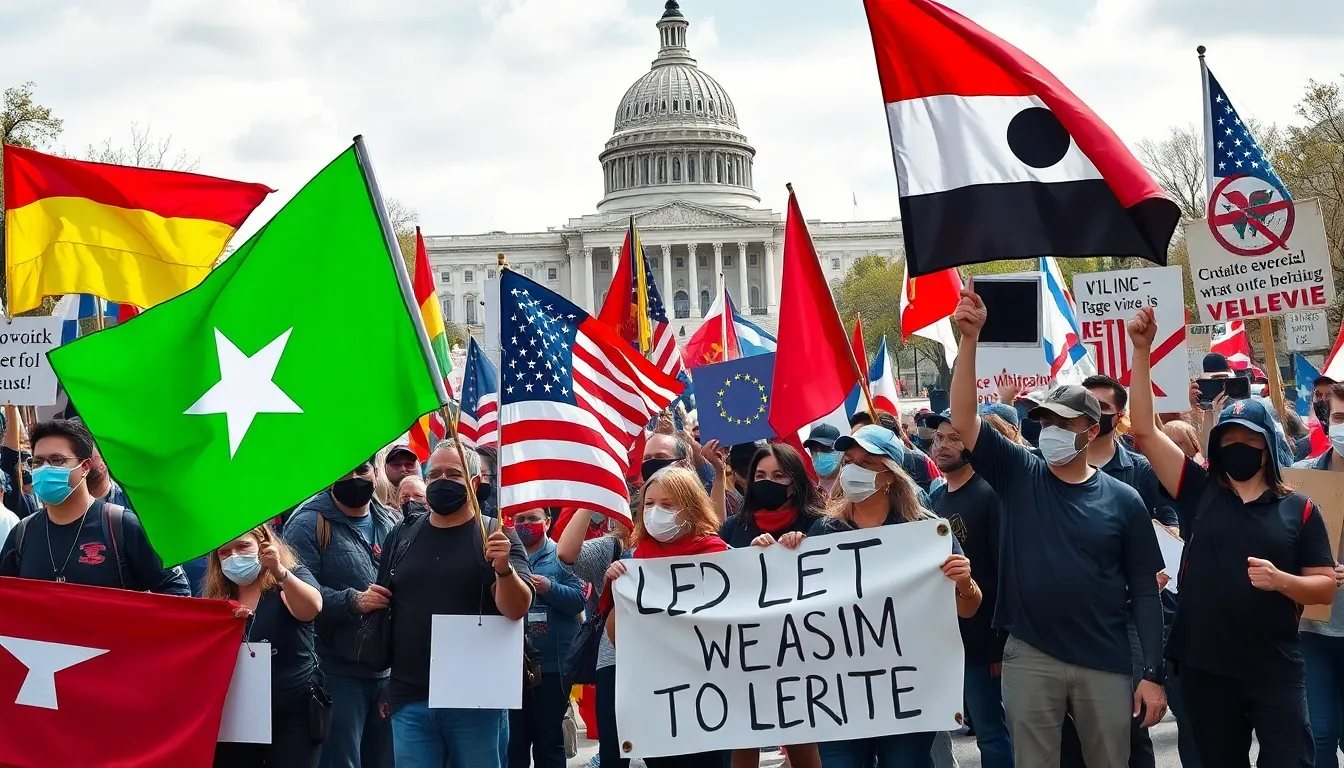Political extremism isn’t just a spicy topic for late-night debates; it’s a phenomenon that shapes our society in profound ways. Whether it’s the rise of fringe groups or the polarization of mainstream politics, understanding this issue is crucial for anyone who wants to navigate today’s turbulent landscape.
Table of Contents
ToggleUnderstanding Political Extremism
Political extremism poses significant challenges to societal cohesion and stability. Its impacts reach beyond fringe groups, influencing mainstream political discourse and contributing to increased polarization.
Definition of Political Extremism
Political extremism refers to beliefs or actions that fall outside of the traditional political spectrum. It encompasses ideologies that advocate for radical changes or reject established democratic processes. Extremists often employ tactics such as violence or intimidation to achieve goals. This category includes both far-left and far-right ideologies, each presenting unique threats to public order. Extremist groups often foster a sense of otherness, promoting division instead of unity.
Historical Context
Understanding political extremism requires examining its historical roots. This phenomenon has appeared throughout history, with examples arising in various countries. Events such as the Russian Revolution and the rise of Nazism illustrate how extremism can influence political landscapes. Political upheaval often breeds extremists, as societal dissatisfaction fuels radical ideas. Cold War tensions further exacerbated ideological divides, showcasing how extremism has shaped global politics. By studying these historical instances, one gains insight into current patterns of political extremism.
Types of Political Extremism

Political extremism manifests in various forms. Understanding these types clarifies their implications on society.
Left-Wing Extremism
Left-wing extremism promotes radical change often through collective ownership and anti-capitalist ideology. Groups advocating for social justice may resort to violence or coercive methods to achieve their aims. Notable examples include the Weather Underground and the Red Army Faction, which sought to overthrow their governments through militant actions. Often, left-wing extremists perceive traditional political structures as oppressive, prompting them to push for revolutionary change. Actions by these groups can lead to significant societal disruption and fear, challenging the status quo.
Right-Wing Extremism
Right-wing extremism emphasizes nationalism, racial superiority, and anti-government sentiments. This group often rallies against immigration and globalization, believing in a return to traditional values. Examples include white supremacist organizations like the Ku Klux Klan and militia movements focused on armed resistance. Right-wing extremists use propaganda and intimidation to influence public opinion and promote their agenda. Their activities can result in violent incidents, contributing to societal division and unrest. This extremism undermines social cohesion and complicates efforts toward constructive dialogue in political discourse.
Causes of Political Extremism
Understanding the causes of political extremism reveals its complex roots. Multiple factors contribute to the rise of extremist beliefs and actions.
Socioeconomic Factors
Socioeconomic disparities often fuel political extremism. High unemployment rates can lead to frustration and a sense of disenfranchisement among individuals. Limited access to education contributes significantly to the radicalization of marginalized groups. Communities experiencing poverty often perceive mainstream politics as unresponsive. Wealth inequality exacerbates feelings of injustice, pushing individuals toward extremist ideologies as alternatives seem more viable. Additionally, economic downturns create fertile ground for extremist propaganda, as individuals seek scapegoats for their struggles.
Psychological Factors
Psychological factors play a critical role in political extremism. Feelings of alienation and frustration can drive individuals to extremist groups. A deep desire for identity and belonging leads some to adopt radical ideologies. Cognitive biases, such as confirmation bias, reinforce existing beliefs while ignoring opposing viewpoints. Moreover, psychological trauma may push individuals toward extremist narratives as a means of coping. The allure of a clear-cut ideology provides comfort amid uncertainty, making radicalism appealing. Emotions like fear and anger are often manipulated by extremist movements, heightening vulnerabilities and promoting extremist actions.
Impact of Political Extremism
Political extremism significantly impacts society and governance, altering relationships and structures. Understanding its effects reveals the depth of its consequences.
On Society
Society experiences profound disruptions due to political extremism. Increased fear and hostility arise as extremist groups promote divisive ideologies. Marginalized communities face heightened violence and intimidation, leading to social fragmentation. Polarized views create an atmosphere where dialogue becomes rare, stifling constructive discourse. Individuals often align with extreme factions, reinforcing ideologies that further divide society. A decline in trust characterizes relationships among community members, making cooperation difficult. Overall, political extremism erodes social cohesion, leaving lasting scars on communities.
On Governance
Governance feels the strain of political extremism, complicating policy-making and leadership. Elected officials may shift their agendas to cater to extreme viewpoints, undermining democratic principles. Legislative gridlock becomes common as parties refuse to compromise, creating an environment unfit for progress. Extremist groups may challenge government authority, leading to increased surveillance and restrictions on civil liberties. Law enforcement faces pressure to respond to rising threats, sometimes infringing on rights in the name of security. The overall stability of democratic institutions erodes, resulting in a less effective governing body.
Political extremism represents a significant threat to societal harmony and effective governance. Its ability to polarize communities and disrupt political discourse cannot be underestimated. As societies grapple with the consequences of extremism, addressing its root causes becomes essential. This includes tackling socioeconomic disparities and fostering inclusive dialogue among diverse groups. Recognizing the dangers posed by both left-wing and right-wing extremism is crucial for protecting democratic values. By promoting understanding and cooperation, communities can work towards mitigating the divisive effects of extremism and rebuilding trust in the political process. The path forward requires vigilance and commitment to uphold democratic principles in the face of rising radical ideologies.




